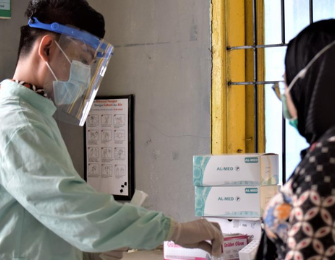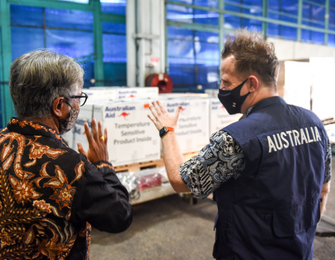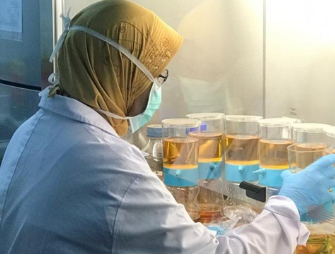In order to identify and respond to potential infectious disease outbreaks, it is important for ministries of health to receive notifications of all unusual health events, for example, from a cluster of sick patients in a hospital in the capital city to unusual animal deaths in the most remote area.
Indonesia and Myanmar will have a new surveillance system run by trained Red Cross volunteers who will report unusual health events that might otherwise go unnoticed. A cadre of community-based volunteers will be trained in how to identify and report unusual events as well as preparing and responding to outbreaks.
They will provide crucial information to supplement the existing surveillance system in high burden, high risk epidemic prone diseases at the community level.
Preparedness and response in communities
The Australian Red Cross will work with communities in Indonesia and Myanmar to develop plans that identify public health risks and ways the community can help to mitigate these risks. Each community will be approached through existing community leadership structures and groups (e.g. women’s groups, religious groups, schools) to seek community buy-in and to ensure that plans take the local environment and culture into account.
Red Cross will work with volunteers and train them in the use of the Epidemic Control for Volunteer toolkit. Volunteers will then have the skills, tools and training to develop local action plans, strengthen community awareness of local epidemic prone diseases and manage prevention and preparedness strategies.
Community Based Surveillance
Working with community based organisations, Red Cross will train community members to be alert to specific local diseases with outbreak potential and unusual events (e.g. animal deaths), and to report these via their mobile phone to the local Red Cross Branch. The Branch supervisor will investigate volunteer ‘alerts’, and if verified (according to agreed case definitions), will notify local government authorities to investigate. If appropriate, they will also confirm the alert, enter the case into the formal surveillance system and mount a timely and appropriate local response.
Community surveillance protocols are developed in partnership with local authorities, and include a ‘safety net’, whereby Red Cross staff at headquarter level can communicate with animal/human health authorities at higher levels if the local authority response is inadequate.
Assessments
In order to support both of the above activities, the Red Cross project will assist governments in conducting assessments of the ability to respond to infectious disease outbreaks, including the community based surveillance approach. The project will work to improve some of the areas identified in the assessments through activities such as: providing refresher training on clinical syndromes; facilitating identification of local level solutions for resource shortages; training on improved stock management at local level to ensure up-to-date supplies and ordering through routine channels; support to develop coordination committees and communication protocols; strengthening of infection prevention and control strategies and identification of local solutions for identified challenges.
COVID-19 Response
Indonesia and Myanmar Red Cross are both managing many competing demands on their time as they step up and fulfil their auxiliary responsibilities to their public authorities as part of the COVID-19 response. Australian Red Cross engagement and support is being delivered remotely. They are focussed on supporting Indonesia and Myanmar Red Cross to strengthen online platforms and tools to deliver training, recognising face to face engagement is likely to be challenging for some time. Weekly virtual meeting are providing the opportunity for learning valuable lessons from COVID and establishing mitigation strategies to ensure Red Cross harness these to inform future implementation approaches.
Learn more:
- Listen to a Contain This podcast with Eka Wulan Cahyasari, Indonesian Red Cross on community preparedness and response in Indonesia.
Australia’s COVID-19 Response
The Australian Government is deeply concerned about the impact of COVID-19 in Myanmar. Australia's existing humanitarian and development programs continue to focus on COVID-19 prevention and mitigation including:
- providing oxygen related equipment;
- building sanitation infrastructure and isolation wards in internally displaced persons camps;
- distributing personal protective equipment (PPE) to affected communities;
- training and community engagement in disease outbreak surveillance and response;
- capacity building in field epidemiology; and
- strengthening laboratory and emergency health operations.
For more information visit Australia’s development assistance to Myanmar.




